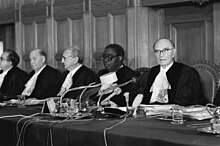Taslim Elias
| Taslim Olawale Elias QC LLD CFR GCON |
|
|---|---|

International Court of Justice (1979). From right: president Sir Humphrey Waldock, vice-president Taslim Olawale Elias
|
|
| President International Court of Justice |
|
|
In office 1982–1985 |
|
| Vice-President International Court of Justice |
|
|
In office 1979–1982 |
|
| Judge International Court of Justice |
|
|
In office 1976–1991 |
|
| Preceded by | Charles D. Onyeama |
| Succeeded by | Prince Bola Ajibola |
| Chief Justice of the Supreme Court of Nigeria | |
|
In office 1972–1975 |
|
| Attorney-General and Commissioner for Justice Federal Republic of Nigeria |
|
|
In office 1966–1972 |
|
| 1st Attorney-General and Minister for Justice Federal Republic of Nigeria |
|
|
In office 1960–1966 |
|
| Personal details | |
| Born |
11 November 1914 Lagos, Nigeria |
| Died | 14 August 1991 (aged 76) Lagos, Nigeria |
| Nationality | Nigerian |
| Alma mater |
University College, London |
University College, London
(B.A., LL.B, LL.M, PhD)
Igbobi College, Lagos
Taslim Olawale Elias (11 November 1914 – 14 August 1991) was a Nigerian jurist. He was Attorney-General and Chief Justice of Nigeria and a judge and President of the International Court of Justice. He was a scholar who modernised and extensively revised the laws of Nigeria.
Elias was born into the traditional of Lagos, then the capital of Nigeria, on 11 November 1914. He received his secondary education at the Church Missionary Society Grammar School and Igbobi College in Lagos. He married Ganiat Yetunde Fowosere, and the couple would have five children together (three sons, two daughters). After passing the Cambridge School Certificate examination, he worked as an assistant in the Government Audit Department. In 1935 he joined the Nigerian Railway and served in the Chief Accountant's Office for nine years.
While working at the Nigerian Railway Elias became an external student of London University, and later he passed the intermediate examinations for the B.A. and LL.B degrees. He left Nigeria for the United Kingdom in 1944 and was admitted to University College London. As this was during World War II, with London the target of frequent bomb attacks, he spent some time at Cambridge's Trinity College. He graduated with a B.A. the year he entered University College London and two years later received the LL.B. In 1947 he was called to the bar at the Inner Temple, where he was a Yarborough Anderson Scholar, and in the same year received his LL.M degree. He continued his graduate education and became the first African to earn a PhD in law from the University of London in 1949.
In 1951 Elias was awarded a UNESCO Fellowship to undertake research into the legal, economic, and social problems of Africa. Later that year he had his first academic appointment, the Simon Senior Research Fellow at Manchester University. There he was an instructor in law and social anthropology. It was also in 1951 that he published his first book, Nigerian Land Law and Custom.
...
Wikipedia
